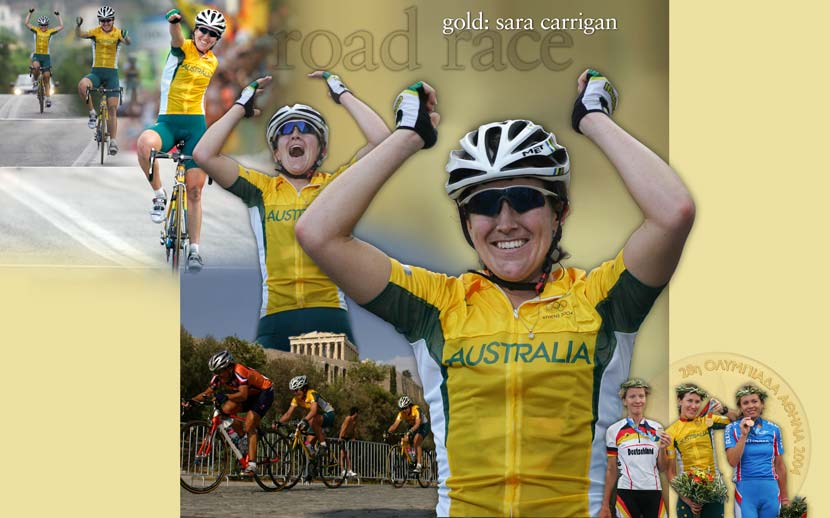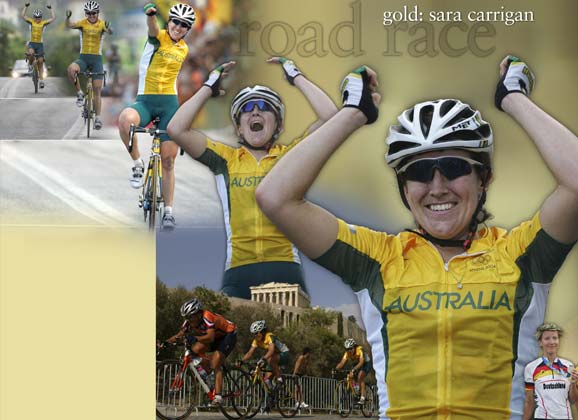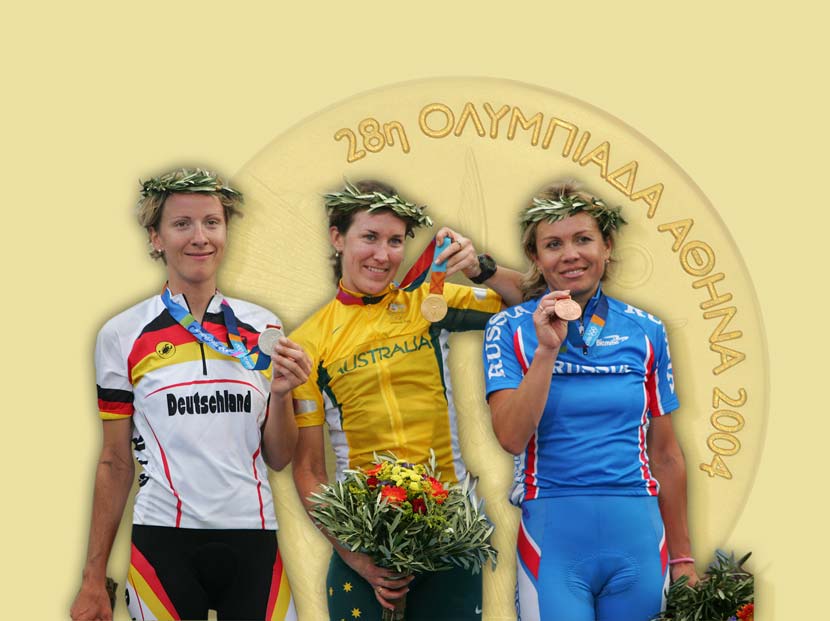Today marks the 10th anniversary of the day Sara Carrigan won the road race at the Athens Olympics. In 2004, RIDE published its first 200 page magazine and it featured a tribute to what was essentially a gold rush for the Australian cycling team that won six titles on the road and track. The first victory was Carrigan’s, on 15 August. Ten years on, we have delved into our archives and retrieved the files of our coverage of what was an amazing time for the sport in Australia.
Rob Arnold caught up with Sara Carrigan on Skype on the morning of the 10th anniversary. To listen to that discussion, click the link to the SoundCloud file (below).
“I really cannot believe it’s 10 years… I share it so often with schools and different presentations that I provide these days, [so] I’m always reliving it and it always feels so close to my heart. It was such a special time and I’m just so happy now that I can share all of my knowledge and experience with other people to help them live their dreams, whatever that might be. For some of them it’s just learning how to ride a bike and feel that joy and exhilaration that comes from two wheels – that’s why I’m still riding, because I’m so passionate about it.
“I still feel that freedom and that release and that feeling of being alive when I’m on my pushy. So I like being able to help other people feel that too.”

As part of a series of flashbacks about the Athens Olympics, here is the feature published in September 2004 (RIDE #26): an interview with Sara Carrigan about her victory over Judith Arndt in the road race…
Athens Olympics road race: 1st – Sara Carrigan (AUS)
“As a team we knew we had to make the most of a good situation.” Sara Carrigan did just that when she easily outsprinted her fellow escapee to win gold in the road race. It may have been early in the Games but her victory was the result of a long build-up, meticulous preparation and the benefit of having the strongest team in the race.
“We were the only country there with two in the break,” said Carrigan who became the second Australian woman to win the Olympic road race. “We decided, right we’ll keep the pace high because we wanted to ensure that our escape group succeeded. That was when it was either her or me. Oenone was obviously the rider from our team who was best suited for a sprint. And it was up to me to either attack or get on the front and drive the break. The best option was to go up the road.”
There was only one result the Aussie trio that contested the road race in Athens was after. It had to be first place. Anything else would have been a failure. Sara Carrigan, Oenone Wood and Olivia Gollan refused to accept any outcome but gold. “We were all keen to get on the podium and all of us were prepared for one to win the race. I think that’s what our strength was,” confirmed the winner.
“We made sure that we were always near to each other and got a good feel of what was going on in the race.”
With a maximum of just three riders per team it was difficult for any nation to dominate affairs. It’s not easy to dictate terms without the strength of larger numbers. Nevertheless the Australian women were in complete control throughout the 118.8km contest that took in nine laps of a tough circuit around the Greek capital.
A strong wind helped keep the temperature to a reasonable level, especially when compared with the scorching heat of the men’s race a day earlier. The conditions required clever tactics and in the early phase of the race no one was willing to risk an attack for fear of using up energy that would be needed to get over Lycabettus Hill later. It wasn’t until lap four that Eneritz Iturriaga of Spain made the first real attack. Surely it was to tempt other teams to spend energy while Eneritz’s compatriot, the 2003 time trial world champ, Joane Somarriba remained comfortably nestled in the peloton.
When the Spaniard’s lead grew to over a minute, Judith Arndt instigated the first of many chases. It was the one recurring theme. The former pursuit world champion was part of a German combination she later revealed – with a colourful gesture as she crossed the line – was not as strong as she believed it could have been.
Carrigan was one rider who would benefit from Arndt’s determination in less than ideal circumstances. “She was absolutely amazing!” insisted Carrigan about the girlfriend of Petra Rossner. It was the omission of the 2002 World Cup winner that prompted Judith to signal her discontent with a raised middle finger as she rolled over the line in the silver medal position.
“You could see that Judith was the strongest rider in that race,” said Sara. The Australian should know. Once Carrigan established the winning move with a powerful surge in the final lap, only Arndt was able to chase her down. The pair stayed ahead of the peloton right to the end, but it was Judith who did most of the pace-setting.
“She was in everything. If anyone attacked, Arndt chased it down. And in the end she was up there at the finish as well. She blamed the fact that they didn’t have the right team but you can never say woulda or coulda or shoulda… what happens is what happens.”
Carrigan knows races can be lost even when it seems as though an unbeatable situation has been established. That was exactly the case in Zolder, Belgium when she was one of a trio with a solid lead on the peloton in the final lap of the world championship in 2002. Together with Somarriba and Nicole Brändli of Switzerland, Sara seemed assured of a medal. Going through the s-bends of the Grand Prix circuit that was used for the worlds two years ago, Carrigan got flustered by the prospect of the sprint.
Instead of conserving energy in the final kilometres, Sara moved to the front of the race she “would sooner forget”. Rather than maintain a steady tempo and keep something in reserve for the final sprint, Carrigan wound it up early, kept the pace high and, within sight of the line, reached her limit. Sapped of strength, she was swamped by the two escapees and an unstoppable Susanne Ljungskög who scored the first of two successive rainbow jerseys.
“Of course the fourth place in Zolder is not a happy memory,” said Carrigan, reflecting on the moment she realised that sprinting needed to be added to her repertoire. “I was in a great position there but was unable to come through with the goods. I’ve definitely learned from that.
“Warren (McDonald, the new national women’s road coach) had a lot of good ideas for sprint training in particular. I took his advice on board and I think it’s been a great improvement.
“What we did was fairly rudimentary stuff, but it helped make training a little bit of fun. It’s nothing more than what most racers do when they’re riding in a bunch. If we saw a sign in the distance, we’d declare it to be the finish line and sprint for it. It gives you a lot more confidence in racing, you know that you’ve done the training and that you’re ready if it comes to a sprint finish.”
Carrigan could not have been more composed in Athens. The demons of Zolder have been relegated by a display of patience that bordered on overconfidence. “I was just thinking, I’ll give it everything! I knew that Oenone was in the little group behind so it was either going to come back together – and if it did, I was going to give her the best possible lead-out to help her in a sprint finish – or stay away like it did and I could take the win.”
The final sprint wasn’t a terribly complicated one. In Athens the end was a total contrast to what transpired in Zolder. Following the wheel of Arndt for the last kilometres of the Olympic race, Sara knew where her winning move would come. She had planned it that way.
“It started when Olivia and I went to Athens around the same time last year – along with Michael Rogers and Stuart O’Grady – to do a reconnaissance of the courses,” explained Sara about a trip to Greece at the time of the European championships late in 2003. “That was a valuable experience. For the whole year that followed I could visualise myself on the course… and I did that quite a bit.”
And even after her escape with Arndt was established, Carrigan was considering the best place to make her winning move. “I picked a mark from where I was going to start my sprint on the previous lap. The result, I guess, suggests it was the right place.”
The women’s road race was first introduced to the Olympics only 20 years ago. Australians have now won two of the six titles. Since Kathy Watt’s success at the Barcelona Olympics, her compatriots have been a dominant force in women’s racing. Anna Wilson won the World Cup crown in 1999 and again in 2001. She was a dominant rider at the Sydney Games but just missed out on medals in both road events, finishing fourth in the races which were won by Leontien Zijlaard-van Moorsel. There are times when not even the best form of your life will alter the result. This was the case for the defending champion in Athens. Leontien crashed heavily just as the decisive attacks were beginning.
“It was such a pity to have a rider of that calibre out of the race in such a circumstance, but what can I do? She just turned around at the top of the climb, her bike moved a little to the right, hit the wheel in front and she came down. It shouldn’t have happened and it’s a big shame. But…”
It’s futile to consider what might have been. There’s a new name in the Olympic record books and Carrigan is happy it’s hers, although it’s not a surprise to those who have followed her career.
At a race in Nerang near Sara’s home on Queensland’s Gold Coast at the end of 1999, I was chatting with the Australian Cyclist of the Year from a few seasons ealier, Henk Vogels. He knows how to spot talent and was largely responsible for getting Baden Cooke a pro contract to start his career. The women’s event had been raced and the presentation was about to begin. Vogels stopped mid-sentence, grabbed me by the arm and said, “I want to introduce you to someone.” He led me past the women who’d made it to the podium that day (Bridget Evans, Kathy Watt and Juanita Feldhahn) and stopped in front of a teenage girl who’d finished fifth.
“I want you to meet Sara Carrigan, the winner of the Olympic gold medal in Athens.” Exactly how Vogels knew the result of a race that was over five years away is beyond me, but since that day I’ve followed Sara’s progress through the ranks with added interest.
In November 2003, RIDE sponsored the Road Cyclist of the Year award and I presented the women’s trophy to Carrigan. How the judges reached their decision is something I’m also uncertain about. There is such a glut of talent these days that the award could have gone to any one of a number of Aussie women. The same can be said for the gold medal in Athens. “It was a joy to race the Games with Olivia and Oenone because we could apply teamwork in such a way that it can help you win a race, especially an important one.
“It’s not limited to the three in the Olympic road race either,” said Sara who was keen to give credit to the crew who are based in Italy during the European season. “The group we had in the AIS team this year has just been amazing. With Amy Safe, Natalie Bates and Lorian Graham – they’re all just so professional. It’s evident in all the World Cup races that we’ve been absolutely committed.”
Oenone became the second Australian to win the World Cup title and together with Gollan she is moving to the team Petra Rossner will manage in 2005. Carrigan’s future is a little less certain. She is still perusing various team offers and hasn’t yet made a decision on which one she’ll accept. “My choice will be based on the riders. As long as it’s friendly and is going to be enjoyable.”
The perfect solution would be for an Australian company to sponsor a team to build on what has been achieved by riders with respect, admiration and friendship. “We all realised that one of us would get the glory,” concluded Sara. “We were simply committed to the win, no matter who it was.”
– By Rob Arnold




